by Michael | Jan 4, 2016 | Blog
Remarriage usually has its issues. A potential complication can arise when either, or both of them, has children.
How should these be involved in the ceremony?
Of course, this is a matter of choice. The children may prefer to stay on the periphery – or you may decide that they should keep a low profile. A lot will depend on their ages.
Here are some suggestions that might work well, particularly with teenage children.
- Planning
Your children could contribute towards the choice of music at the reception. You might be surprised at what they actually ask for – and it will be special if they are out on the dance floor (voluntarily) from time to time.
If they are artistic, children may be able to help create the ceremony décor; very musical ones might be able to sing a bit at the service, accompany the music on guitar etc. (if up to it!) or simply do a reading.
Children might be allowed input into the choice of menu at the reception – especially if they are getting a different meal.
Do give each of the children a role, and, unless it is unavoidable, don’t leave anyone out.
- Invitations
If you can afford it, why not let your friend/daughter invite a friend (each)? Even the moodiest of teenagers will appreciate the gesture, and your kind thought may spare him/her from what can be a fairly isolating experience.
- The Ceremony
There are plenty of ways to involve the children in the ceremony itself. Traditionally, they can be asked to be ushers (groomsmen) or bridesmaids. But younger boys could do the Best Man bit with the rings (although I understand it if some might consider that a risky move!). They could always be the ones who give Mum away at the start of proceedings.
- Unity Rituals
A lovely idea is to ask the children to participate in a ceremony ritual. They could make vows to their new step-parents (who could reciprocate). They could be part of a sand-blending ceremony, but my favourite as a civil celebrant is the Unity Candle.
Provide each child with a taper and (health and safety permitting!) they and the couple all use the tapers to light the Unity Candle at the same time. The symbolism is strong and affecting.
- Make the children feel special
After the ceremony, children could help usher guests through to the reception. Then, with age of course a determinant, an older child could propose a toast at the reception.
They might be given flowers to present to their mothers or new step-mothers at the time of the speeches.
Depending on the child’s maturity, he/she could be allowed a very short speech.
Dancing with the step-parents can be lovely (although it may be as well to warn the step-child well in advance!).
As the children (like it or not!) are joining a new family, it makes a lot of sense to include them wherever possible on, and maybe before, the big day. If you can start bonding with them in early days, that has got to be for the best.
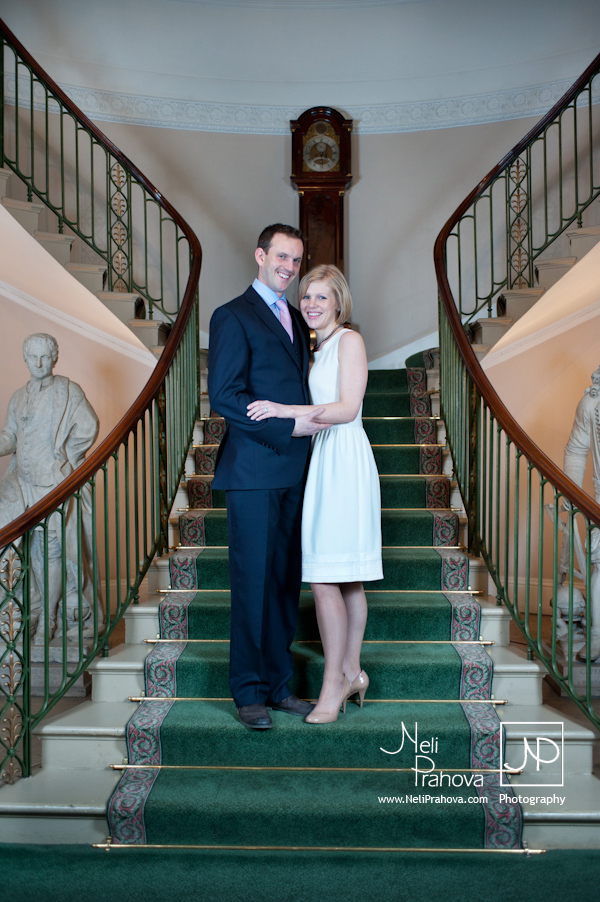
by Michael | Dec 30, 2015 | Blog
Most of us would agree that preparing for a wedding should have a government health warning attached! So how can marriage be good for your health? Surely that start to married life must be one of the most stressful things you’re going to encounter.
Until you have children. Or your marriage hits the rocks. Or someone close to you dies. Get the picture?
Well, I don’t suppose you’ll believe it, but, according to recent research, marriage may actually benefit your health.
[And that refers to women, as well as to men, by the way!]
A surprising fact
Studies have shown that people who are widowed, divorced/separated or unmarried are likely to die earlier than married people.
So why should this be?
Possible Explanations
There can be no single reason, and there may also be some very particular reasons – thus a rich couple may live longer simply because they are able to afford better health provision.
Wealth
Talking of wealth, you can justifiably claim that the acquisition of wealth may well entail great stress (depending on how you acquire it!), but the reverse is also true: if both of you are earning a reasonable income, you are likely to be more relaxed and at ease. After all, finances are a major cause of stress. There is evidence that suggests that married men are likely to earn 40% more money than single men and security is a great stress-reliever.
Employment
Job security is another factor – and the fact that you are married can indicate trustworthiness and security to your employer, which can improve your prospects – and put you ahead of otherwise comparable competition at a job interview.
Health and Safety
As far as health is concerned, being part of a committed married couple reduces your risk of contracting sexually-transmitted diseases.
Couples tend to watch out for each other’s health and can often identify potential problems before they become serious. They may also encourage (nag?!) the other to have a “minor” issue checked out.
Married couples also appear to be less likely to get involved in potentially violent disputes between others. Moreover, single/divorced women are far more likely to be victims of violence than married women. Likewise, unmarried men are also at greater risk of violent crime than married men.
Solitude and Intimacy
According to evidence that must surely be a little anecdotal (!), considerably more married couples engage in sex each week as opposed to single or cohabiting individuals. This has health benefits (not just because exercise is praiseworthy), as sex releases endorphins that improve mood and can reduce stress (and encourage more of the same).
Mental issues
Various studies indicate that married men or women are far less likely to commit suicide than their single counterparts, and the same goes for indulging in alcohol and illegal drugs. In fact, an international study has found that married people are likely to be significantly happier than unmarried ones. (I don’t know how they quantify happiness, but these studies appear to have been carried out scientifically.)
Conclusion
Of course, there are unsuccessful marriages (the divorce rate alone indicates that) and, as I have said, some of the so-called evidence seems hard to demonstrate as hard fact, but there is enough here to convince me that I am doing the right thing as a civil celebrant by helping people get married! I gather that there are some massive fringe benefits for my couples!
by Michael | Dec 30, 2015 | Blog
A morning wedding?!!
A lot of people assume that a wedding should take place in the afternoon or, possibly, evening.
That makes some sense. It gives people living at quite a distance from the venue a chance to leave home at a respectable hour and not arrive too drained. Then they have the option of staying locally overnight after the festivities.
“I’m Getting Married in the Morning!”
But supposing it wasn’t that way round? What if guests stayed overnight before a morning ceremony and so were nice and fresh for it? True, they would have to watch what they drank, if driving back later that day, but it would not be ridiculous.
Another great reason for having the event in the morning is that it is normally considerably cheaper.
As there will be less competition at that time, the venue hire ought to cost less and you can probably get pay-per-plate items for a lot less than you would later in the day.
And remember, cheaper doesn’t have to mean worse.
The Ceremony
You should have no trouble getting the registrars to do their bit for you in the morning, and the same should certainly apply for the civil celebrant. It won’t affect the cost, but it will work every bit as well.
The Reception
Food
If you’re offering brunch, that means you can have breakfast and lunch items, which can add variety (without costing too much). You can offer a Full English (with vegetarian alternatives), but also, possibly, steaks, even salads, and waffles or the like.
Drink
Some people may not want to drink alcohol in the morning, so teas, coffees, mineral water, lemonade and fruit juice should be on offer. However, some people will definitely want a celebratory alcoholic drink or two, and some champagne may well be appreciated.
Revelry
It may be a (late) morning reception, but you can still have music and dancing (and certainly speeches – if the latter can be included under the heading of ‘revelry’!). The entertainment may well be a little more subdued than you might expect at an evening gathering, but no less enjoyable for that!
There should also be a cake (people love the photo of the couple cutting the cake – and often enjoy the cake itself, of course!). Sweet stuff is sometimes less appreciated in the morning than later, but don’t be surprised if you won’t be taking much away afterwards in the doggy bag!
In conclusion
A brunch wedding can be as formal or informal as you like. That goes for the ceremony as well as the reception. For the festivities you can provide food stations, or a regular sit-down four-course meal. You can have fine china, table service, flowers, entertainment for kids, and so on.
The joy is that the choice is yours, and for what should be considerably less expense, a morning wedding can be every bit as memorable and enjoyable as an afternoon one.
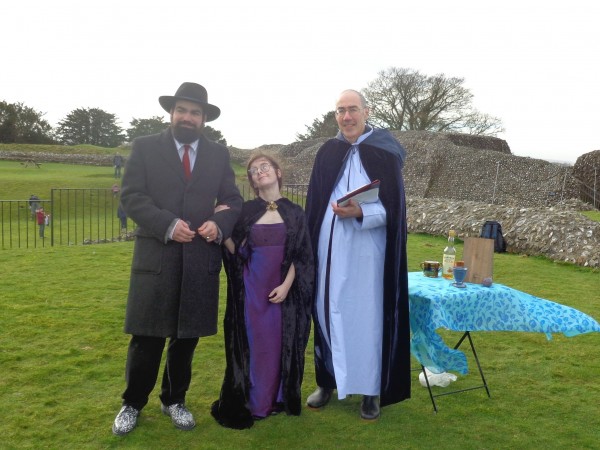
by Michael | Dec 29, 2015 | Blog
Although I do my best to get about and spread the word, I find there’s still a lot of confusion about what a civil celebrant really does and what they can offer. Perhaps I can clear things up a bit.
Imagine …!
What if a full religious wedding doesn’t rock your boat?
What if the totally non-religious, standardised Register Office ceremony isn’t really all that special for your big day?
What if you could go to the Register Office in the morning in your jeans, with a couple of witnesses, sign the marriage certificate and then enjoy a wonderful, joyous, memorable ceremony in the afternoon with all your guests?
Nowadays, you can. That’s where a civil celebrant comes in.
As long as the legal bit is still carried out, there’s nothing to stop you holding the ceremony you actually want – at the venue you want, in the way that you want.
The Ceremony
One of the beauties about a celebrant-led wedding is that he or she will help you (as much or as little as you want!) to build your own ceremony. So if you want a religious component (or perhaps one or two elements drawn from various cultural sources), put that in, by all means; if you want spiritual bits, go for it; poems and favourite texts are absolutely fine. With some give and take, you should be able to please yourselves AND keep your parents happy!
As with the readings, you decide on the music. You also decide on the choreography (who walks or stands where), the readers, any address, the wording, and delivery, of the Vows. Your celebrant will be pleased to advise and make helpful suggestions. This process is usually conducted by e-mail after an initial mutual fact-finding conversation (face-to-face or by Skype).
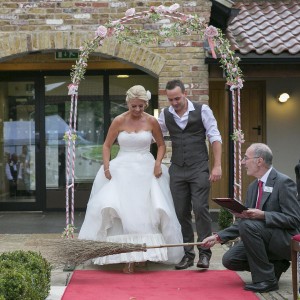
Ritual
You will be able to incorporate any rituals and little touches of your choice that would not otherwise be possible. For example, drinking from a loving cup, burning a Unity Candle, Jumping the Broom or celebrating a handfasting (an ancient Celtic betrothal ritual).
Conclusion
In short, this is YOUR day, and your civil celebrant, who will of course conduct the ceremony for you, will do everything to ensure that the day is unforgettable, meaningful and what YOU want.
I hope this clarifies things. If you still have questions, don’t hesitate to ask me! I’ll be delighted to help.
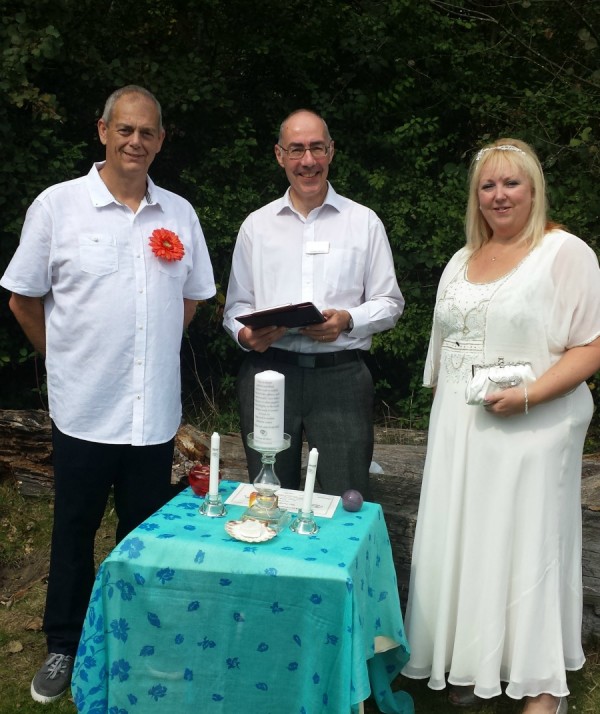
by Michael | Dec 21, 2015 | Blog
We like – and need – rites of passage. These include baptism, confirmation,weddings, 21st birthdays, and (less popular!) death. They may also include Vow Renewals.
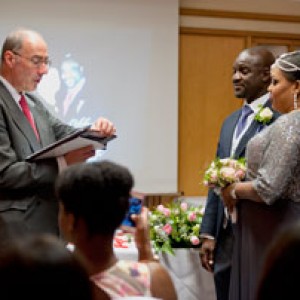
Vow renewals can seem irrelevant to you, unless you’re approaching a significant date or know of someone else who is. So what is the point of them?
Why consider a Vow Renewal?
- You’ve got through a whole year of marriage. You’ve learned how to share, compromise and live together. Well done! Why not mark this achievement in some way?
- You’ve managed five, ten, fifteen or twenty (you get the picture!) years together. Now that’s a real achievement! You could certainly recognise that in company with your friends and relatives.
- Maybe your marriage has been rocky, but you’ve come out on the other side, and you want to re-commit publicly.
- Maybe you married abroad, and would like to share the occasion with your friends over here.
- Perhaps you have acquired a whole new set of friends and even relatives since marrying.
- Maybe the vows you took have become irrelevant and need reformulating and restating.
- You might even simply be looking for an excuse for a celebration!
These are just some reasons to consider having a public ceremony, or Vow Renewal.
Advantages
You can have your ceremony wherever you choose (of course, you may need to get permission, etc., in the normal way).
You can invite whoever you want and as many people as your budget allows.
You can include whatever you wish in the ceremony – readings, ritual, music, readers, etc. Your civil celebrant can advise and guide you. (Note that you will have the final say)
The tone of the ceremony (light-hearted, formal, etc.) is up to you.
You can include whatever elements matter to you – eg ring blessing, rewritten vows, handfasting, for example.
It needn’t be an expensive ceremony: at a basic level, you will need to pay for the venue (if you’re booking one), the civil celebrant, refreshments (if you’re having any), maybe a new set of clothes, and not much else.
Examples
I have officiated at venues as different as a Mayfair hotel and a Canal Centre. The Shard has been suggested as a venue, as has Waterloo Bridge and even at sea on the Queen Elizabeth. For a handfasting vow renewal, the inner circle at Stonehenge is an option. The world is your oyster!
If you can think of anybody who might appreciate a ceremony of this kind, I’d love to give them some help and guidance.





